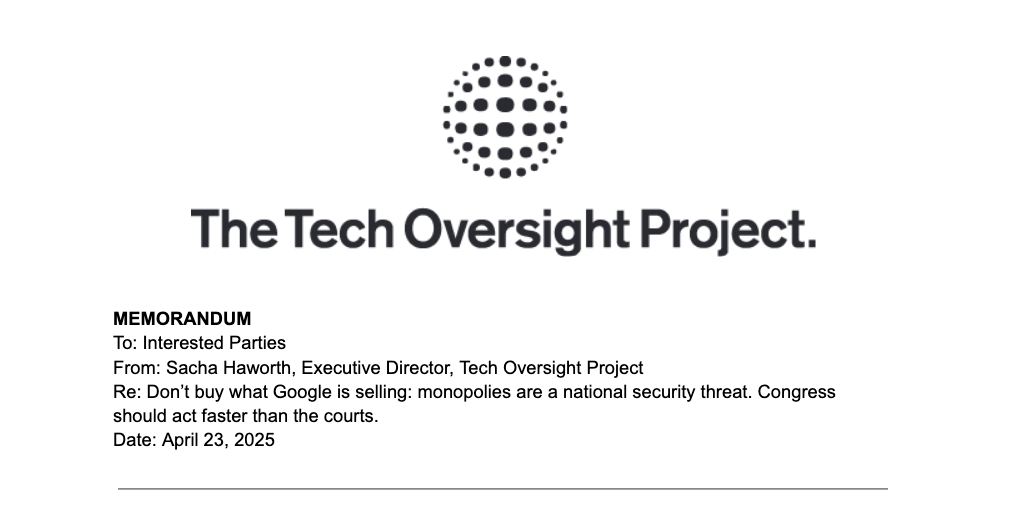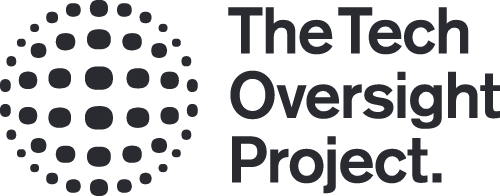ANTITRUST TRIAL BONANZA, TOP Memo to Lawmakers

Welcome back to The Dispatch from The Tech Oversight Project, your weekly updates on all things tech accountability. Follow us on Twitter at @Tech_Oversight and @techoversight.bsky.social on Bluesky.

📄 TOP MEMO TO LAWMAKERS: Don’t buy what Google is selling: monopolies are a national security threat. Congress should act faster than the courts.
While Democratic and Republican administrations are winning in the Judiciary, Congressional wins have been few and far between. With the AI race against China raising the stakes, now is the right time for Congress to take up the mantle of holding Google accountable.
We believe that through pro-competition legislation, comprehensive privacy legislation, robust appropriations for antitrust enforcers, and targeted oversight, Congress can put its thumb on the scale to put the U.S. economy back in the driver's seat.
For our thoughts on legislation and oversight opportunities, learn more here.

⚖️ LAW AND ORDER: Google’s Ad Tech Monopoly: Last week, Judge Brinkema laid down the antitrust law by ruling that Google’s ad tech empire violated the Sherman Act. It’s a clear win for consumers, the entire American economy, and it’s a long-overdue victory for the local news outlets that have been steamrolled by Google’s ad monopolies.
TOP’s Sacha Haworth: “This ruling is an unequivocal win for the American people that will help lower prices, increase competition, and lead to a better internet for everyone.”
🔊 DUN DUN: But another showdown is happening this week, just across the river in D.C. That’s where Judge Amit Mehta — who already ruled that Google Search is *also* an illegal monopoly — will now decide what the remedy should be. The DOJ is seeking a real and enduring fix, including the possibility of forcing Google to divest Chrome entirely or open its data to competitors.
At the center of that case: Google’s illegal and predatory default agreements with device makers and web browsers helped lock the search engine in as the near-universal option in search. The problem? Google bought up the entire market, which is illegal. Google then leveraged that king-maker monopoly by hoarding massive troves of personal data, elbowing out emerging rivals, and tightening its grip on the industry.
All eyes are on whether Sundar Pichai can persuade the courts to not do the obvious and right thing – impose structural remedies that restore competition and deny Google the fruits of illegal monopoly.
🔊 DUN DUN: Google has not exercised its right to remain silent. The Big Tech monopoly aggressively lobbied the Trump administration to go easy – failing to make the case that mild restrictions on its browser deals would be enough to change its behavior.
The company says a breakup would damage U.S. national security (the opposite of the truth) and give Chinese companies a boost in the international tech race. [Read our memo to lawmakers dispelling Google’s lies here.]
Google also adds that the remedies the DOJ’s asking for would hurt the economy and reduce innovation, but in reality, it’s Google staid and lackluster monopoly that choked off innovation for years. These last-ditch efforts to sway the court belie a greater truth: Google knows the DOJ’s proposed remedies would fundamentally change its business model. That’s a great thing for innovation and start-ups everywhere.

“A breakup of Google would be the most significant action taken by a court against a monopoly since a federal judge tried and failed to split Microsoft in half 25 years ago.”
— David McCabe, New York Times

⚖️ ZUCKERBERG IN COURT: Meta’s long-delayed antitrust reckoning is finally here — and Mark Zuckerberg’s biggest problem isn’t what others said about him. It’s what he said himself.
At the center of the FTC’s blockbuster case is a simple charge: Meta bought Instagram and WhatsApp to kill competition in the family-and-friends social media market. The proof? They’re in Zuckerberg’s inbox. He told the court he bought Instagram because of its camera app, but internal emails reveal he aimed to neutralize a rival, even though he knew it would raise antitrust concerns. His own CFO even told him that was a bad idea. Zuck’s response? Full speed ahead. And there’s many, many more emails saying the same.
From the trove of documents: Zuckerberg wrote that “it’s better to buy than compete,” admitted that acquisitions were part of a strategy to lock down “network effects,” and framed emerging competitors as “highly urgent threats.” And just like that, Meta walked the court into a living antitrust case study — courtesy of its CEO’s sent mail folder.
The FTC is seeking a $30 billion settlement and structural remedies, including a consent decree and potential spin-offs. Meta, hilariously, offered $450 million. FTC Chair Andrew Ferguson shot it down and countered with $18 billion and a ban on future monopolistic conduct. Needless to say, no deal.

Tech Policy: Why Meta’s FTC Trial Matters for Keeping Young People Safe Online
Breaking off Instagram from Meta would restore much-needed competition to a tech sector that, at present, shrugs off the backlash against its dangerous practices so it can keep monetizing children and teens, says Zamaan Qureshi.

🙊 META’S WAR ON WHISTLEBLOWERS: Following Sarah Wynn-Williams’ explosive whistleblower testimony, Senator Grassley (R-IA) sent Mark Zuckerberg a warning letter demanding he stop the secrecy and lawfare on whistleblowers.
Grassley noted that Meta’s severance agreement, according to Wynn-Williams, threatened $50,000 fines for any disparaging statements she makes about Meta, even if they’re true — which would violate SEC whistleblower protections. He also demanded Meta hand over information about how Zuckerberg and his lieutenants may have instructed employees to hide information from Congress.

🤢 ZUCK TAKES HIS WAR ON KIDS LOCAL: As consensus builds among teens themselves that tech CEOs are creating products that hurt kids, Mark Zuckerberg’s carelessness with young people’s wellbeing just hit close to home this week in Silicon Valley.
Zuck and Priscilla Chan’s initiative didn’t give a reason for their abrupt announcement yesterday that their much-touted tuition-free schools for low-income kids in Silicon Valley will close. This could be a new lowlight in the celebrity-school-announcement genre, one of the most cynical ploys in the book when not accompanied by real long-term commitment.
A crying parent whose children are among 400 students at the East Palo Alto campus told local news: “I just hope in the future somebody has a change of heart and will just be willing to keep the school going.”
As Zuckerberg disappears, the remnants of his last political chameleon act to pull together a ham-handed MAGA facade that nobody’s buying – those vulnerable kids he leaves behind? More collateral damage at the hands of Meta’s careless, cynical CEO, whose fickle charitable endeavors now hold a decadeslong track record of destabilizing local K-12 education – and kids’ futures.
For further reading, learn more about Mark Zuckerberg’s newly purchased $23 million DC mansion and the nearly million-dollar watch Zuck sported while rolling back Meta’s trust and safety policies.

